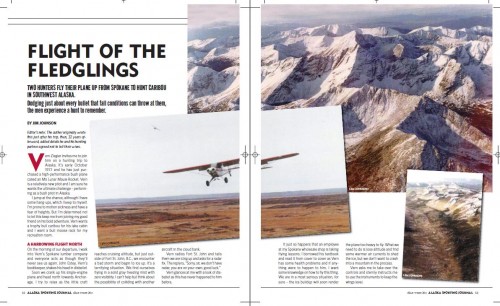
Meet The Survivors: Q&A With Podcaster, Survivalist Donny Dust
The following appears in the January issue of Alaska Sporting Journal:
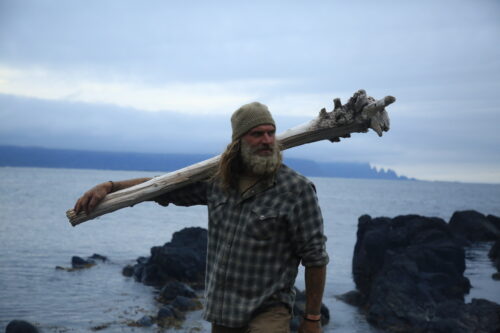
On some days, he’s a survival school owner and published author, and on others you can call him a TV personality and father of two outdoors-loving sons.
“I stay busy,” Donny Dust says simply of his workload.
These days, Dust has also joined the podcast cosmos, as the noted survivalist expert shares remarkable stories of heroism in everyday life and in the most dangerous of circumstances. Among the episodes of Dust’s Rescue podcast: A good Samaritan who tried to save fellow passengers following a 1999 London train collision; the aftermath of a 2013 terrorist attack at a Nairobi, Kenya, shopping mall; recollections of the famed 1987 rescue of Baby Jessica, a toddler who had fallen into a well in Midland, Texas.
“The podcast is the one thing that kind of keeps me out of the mountains, but it’s one of those things I’m working on,” says Dust, a U.S. Marine Corps veteran who also cherishes connecting with the people who faced life-threatening nightmares and those who risked their own lives to intervene.
“These are the folks that we need to not necessarily idolize, but give praise to and acknowledge that there are many people out there like that. I’m humbled to be able to share the stories and to be part of that adventure. And I hope the listeners really resonate with who these people are and what they’re willing to do.”
One of the podcast episodes that means a little more to Dust – a regular visitor to the Last Frontier – focused on an Alaska mountain, two climbers and a freak accident that threatened their lives and tested their resolve. In 2002, veteran mountaineers Charlie Sassara and Jack Tackle were scaling daunting Mount Augusta, located on the border of Alaska and Canada’s Yukon Territory. A chunk of icy rock the size of a briefcase came crashing down on Tackle, leaving him partially paralyzed and forcing Sassara to leave behind his injured climbing partner and go for help (see sidebar below).
We chatted with Dust about this incident, his passion for all things Alaska and the joys of introducing his sons to the outdoors. (This interview has been edited for clarity.)
Chris Cocoles In getting to know Charlie’s and Jack’s story on the podcast episode, what was your takeaway from their adventure/ordeal?
Donny Dust I think the Jack Tackle and Charlie Sassara episode is my personal favorite. I think it really stems from my own background of climbing and mountaineering with my father, and now rock climbing with my 15-year-old son today. So, I find it to be one of those kinds of emotional things where I know Jack and Charlie, they’re connected by their rope, and then there’s a cutting of that rope – a tethering, if you will – and they kind of have to go their own separate ways. One’s on a mountain, fighting for survival while he’s completely immobile, while the other is going to get help. And I think in that context, there’s a point of relation for me personally, where it’s like, man, I’ve been hanging on the sides of cliffs, jumped over crevasses, and I think having that ground truth into their own personal experience just paints a whole different reality for me personally and I think for many listeners in that entire episode. Jack and Charlie are two phenomenal mountaineers – just experts in their field. But it’s just a reality that, even as good as you know you are, the training and the skills and the knowledge associated with that task, accidents can happen. And they are the perfect example of two great mountaineers; they’ve dealt with adversity and it starts to impact their climb. But they adapted and overcame, and ultimately, it was a case of, “Look; I’m going to go and get help. This could be the last time we see each other. But if this is the case, I love you, my brother. I’m going to get help; I’m going to make sure that you can get out of this alive.” One had to cut the other one loose and ultimately get help. It’s a pretty emotional story. And I find it my favorite, to be honest with you.
CC Is that the hardest decision that needs to be made in that situation – to have to make the choice to separate when one is badly hurt? That needed to be done, but I’m sure it was a difficult choice to make. DD Yeah. It’s a really unique situation – one of those situations people normally don’t face in their routine lives. It’s only in those extreme situations that you’re going to come across in those events where you’re like, “Look; one of us might not make it out of this alive. And if that’s the case, I’d rather you make it out of here alive.” It’s that willingness to sacrifice your own life to save someone else. Everyone talks about, “Oh, I’d take a bullet for you.” But it’s a metaphorical bullet. When the bullets really start flying, it’s, “What are you doing?” In their case, they were willing to just say, “Look; I know we have to separate, but this is ultimately to keep us both alive.” Because they could have both sat up on that mountain and said, “This is it; we’re going out together.” Or like true mountaineers, true Alaskans, true climbers, they’re going to continue to fight through the pain and the adversity, and do what they have to do to get it done and save one another.
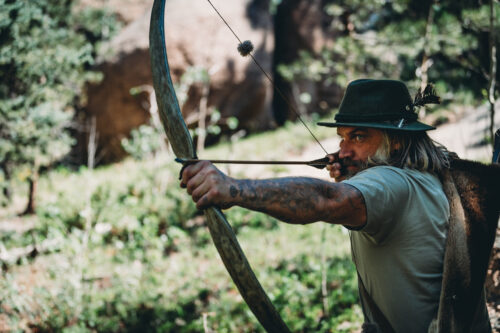
CC And they left their sat phone back at camp. Is that the best approach to leave the phone behind so it stays safe, or do you need it in case of an emergency like that?
DD There are a lot of scenarios out there. But I’m on their side there on that whole thing. Even when I head out in the bush, I don’t bring a phone. It’s not arrogance; it’s a level of confidence. It’s a level of ground truth that you’ve been out there and you know exactly what you need to do. But in the event of something (happening), there is that backup plan and you just have to get to it. So I think for them, they had been climbing and they had been preparing and they knew what they needed to do. The probability of some kind of major catastrophic event happening was slim to none. In their minds, they’re prioritizing their climb – optimal gear, weights, measurements; the whole nine yards – and saying, “Let’s focus on what we really need, but we will have this little safety blanket.” It’s far away, but it comes with that expertise and it comes with (having) that confidence.
CC I guess even despite them being seasoned mountaineers, it’s a case of you just never know. But also, is it part of the thrill and adventure of why you’re there in the first place?
DD Absolutely. I think for anybody that has any pursuits in the outdoors, it is the thrill of the unknown. What sort of adversity can come your way? It is that uncertainty of, “Could I experience these hardships?” That kind of draws people into that venue, if you will. I know in their case, mountaineering is inherently dangerous. There are a number of problems that can fall – from an environmental situation to a technical situation, as far as their gear, their crampons, their ice axes. And I think when people are kind of intermixed in that pattern of life, it becomes a little bit of a thrill, a little bit of a rush, where there is a chance of death; there’s a chance of extreme adversity. But I think that’s where the beauty is on the back end; you can overcome it all. And they clearly did, which makes their story an example (of that) for years to come.
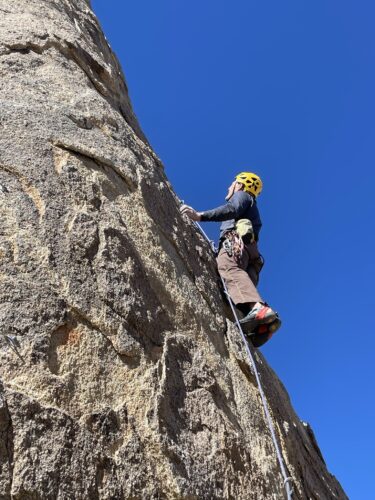
CC For all the podcasts that you’ve hosted – and it’s a wide variety of stories and settings – do you try to put yourself in their moment of truth when you’ve researched and then shared their tales of survival?
DD I think in every single episode, it portrays what I like to call (a story) of the everyday person. And I think it allows me to connect with them. Because even though I kind of have a life of adventure in the outdoors, I’m still a father and I’m still an everyday person, and it’s one of those things where I get to step into their shoes. And they are the perfect example of what heroes truly are. I always say people are the real first responders. It’s seeing a car accident on the road and somebody getting out of their car and going to administer help; it’s somebody going to a plane crash; it’s two mountaineers; or it’s (helping) at a train station crash. It’s the people who respond first and are willing to actually lay their lives on the line to save someone else. Jack and Charlie, they are two technical experts in their field. They’re willing to keep the other alive at all costs, which is beautiful.
CC Those two were friends before, but I’m sure if you experience something like that as a pair, you must be kindred spirits for life going through an ordeal like that. DD I think in any form of adversity, whether it’s mountaineering or serving a deployment or some other extreme situation, it draws a bond and a commonality in a way to heal that trauma someone could have suffered in that aftermath. It’s creating that band of brothers and sisters that you can rely on, knowing that you’ve overcome this together. You’ve beaten the odds as a team and a partnership.
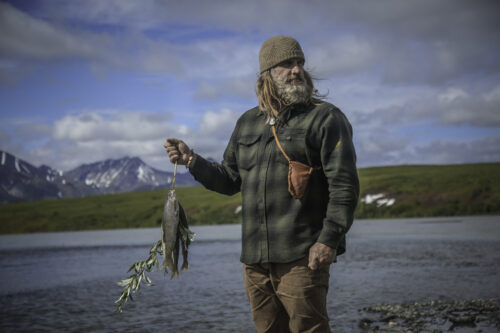
CC Can you share some of your own Alaskan experiences, since you’ve spent a lot of time there?
DD I love Alaska. It is one of those places of mystery, and of great land expanses and so many different offerings. I’ve spent many days and nights walking through the Alaskan bush, and I can say that there is an extreme level of challenge up there. And I think that draws me to Alaska. I enjoy my time standing on the edge of a river and pulling out fish, whether it’s salmon or grayling, and seeing the wildlife. But it offers so much. And I would say to all Alaskans: Let’s keep it a secret. But for some of us, that’s where we plan on going, and I truly believe that Alaska is one of those frontiers where it is full of hardships, but it’s full of so many great accomplishments and beauty, and history and stories. It’s this magical land that people fear in certain ways and they’re fine staying on their cruises and going into the ports. But for some of those real adventurers, those real explorers, they like to head into the interior and like to climb those mountains; they like to see the wildlife. It’s absolutely amazing. I’ve loved every minute there; I’ve loved every experience, every black fly bite, every bit of rain, every bald eagle, every moose I’ve seen, every brown bear that I hope to keep seeing at a distance. [Laughs.]
CC It truly is the Last Frontier. And is there a place there that’s still on your bucket list? DD I would really like to climb Denali one day. I started mountaineering when I was a teenager on some of the peaks in the (Lower 48). But Denali has always been one of those ones that you’ve seen, and I’ve camped around the base and hiked all through there. But it holds this level of mystery; man, to climb up a mountain in Alaska! The state has hardships enough, but to climb Denali is one of those things that I’d absolutely love to experience.
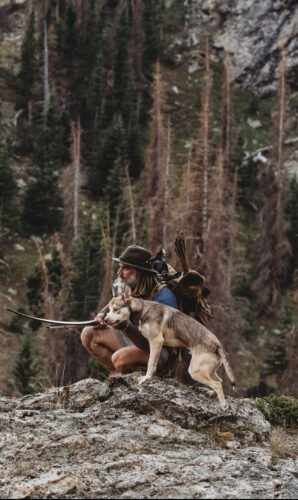
CC I’ve talked to a mountain climber who scaled both Mount Everest and Denali, and he told me it was more of a challenge to climb Denali. Do you see that potential in an increased degree of difficulty on that peak?
DD Yeah. I think Everest has become popularized and Denali is still that raw, enigmatic place where anything can happen. Some of my best memories in Alaska are jumping off a bush plane, finding some ptarmigan feathers, tying those into some flies, standing at the mouth on the Sandy (River) and just pulling grayling out one after another. I’ve loved all of my experiences there. When it comes to hunting and fishing out there, it’s definitely one of those things that draws me to it routinely.
CC You run your survival school, have written books and appeared on TV shows – do you love the problem-solving and troubleshooting aspects of survival situations?
DD I always tell people the number one survival skill is creativity. And when you’re facing the bush with rain or other inclement weather or wildlife – all these different kinds of problems, if you will – you have to use your creative processes to ultimately solve those problems. Or to find a solution that will get you by. Because survival is really just getting by. But the goal is, through that creative process you can move to that place where you can thrive – where you have a lot of food and have a lot of safety; you have warmth. And I think that’s one of the things that draws me into that survival world is being able to use creative processes and solve problems. No matter what they are and how often they come, it’s the challenge of the unknown and the challenge that anything can happen; and you have to be prepared and think on the fly and solve it.
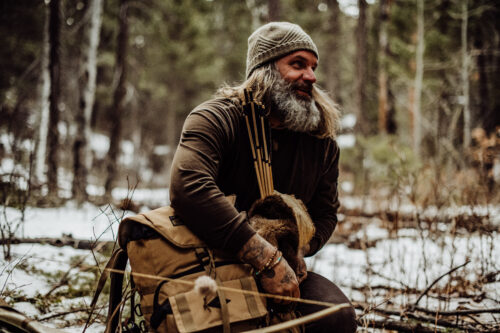
CC At your Paleo Tracks Survival school (paleotrackssurvival.com), when hosting maybe some less experienced survivalists who want to learn, what’s the one most important point you let them know about?
DD There are a lot of points that I go over with people, but one of the key things is this opportunity to get some training and learn some skills can’t be one and done. It’s just like anything in life; you have to stick with it and always revisit it. Practice your firemaking and your land navigation and identifying areas where it’s not safe – because it’s the middle of the rut or bears are coming out of hibernation with cubs. It can’t be a one time sort of thing. One time is good, but you have to keep revisiting it. And that’s not trying to pitch people to come back for more classes. [Laughs.]
Take what you’re learning here and go off on your own adventure and exploration and see what you can apply. And if you find gaps or holes in that kind of process, that’s your time to self explore and be like, “You know what? I was really cold on night one, but on night two I got a lot warmer because I changed the location of my tent and built my shelter on a little bit higher ground away from the water, and I had a much better night.” The natural world is a learning process, and it’s important for all of us to kind of return back to it and re-learn certain skills. And Alaska is a great place to do it.
CC Now that you have your two sons and they’re sharing this life with you, is it a special thing for you to have introduced them to the outdoors and what you love to do?
DD Having two sons, it’s absolutely amazing to give them a different perspective on the natural world. My youngest boy loves rock climbing and snowboarding, and my oldest loves cooking fish in the bush and getting into the plants and foraging. It’s just an amazing experience where we can all kind of come together in all these commonalities of the natural world. Those experiences are what it’s all about – having my knowledge and skills and ability and being able to give them something that they can take and ultimately pass onto their kids. And hopefully those traditions continue. ASJ
Editor’s note: Listen to podcast episodes of Rescue at Apple, Spotify or wherever you get your podcasts. For more on Dunny Dust, check out his website (donnydust .com) and follow him on Instagram.
Sidebar TWO MOUNTAINEERS FACE A CRISIS ON MOUNT AUGUSTA
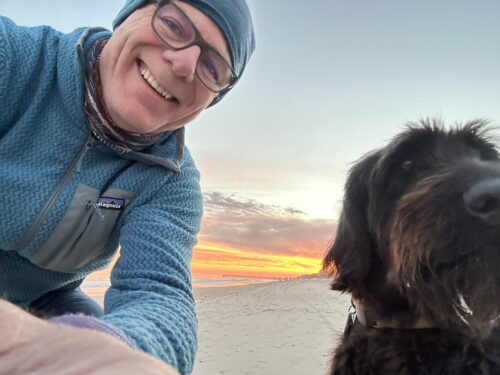
CRISIS ON MOUNT AUGUSTA
Donny Dust’s new podcast Rescue, which released 10 episodes last fall, essentially offers listeners a question: What would you do if you found yourself or found others nearby in a life-and-death situation?
One of the stories recalled a 2002 ascent of Mount Augusta, a challenging 14,000-plus-foot and rarely scaled peak located in the St. Elias Range straddling the Alaska-Yukon Territory border. Such a climb is a test for even skilled mountaineers like friends Jack Tackle and Charlie Sassara. They needed to be skilled in the sport, for sure. But teamwork was also going to be a vital variable in their summit attempt.
“They say the most important thing in climbing is picking the right partner,” Dust narrates. “You want to be sure you can trust that person with your life.”
That certainly proved pivotal for what Sassara and Tackle would endure during what seemed to be a successful trip up the north face of a mountain that had never been summited from that side.
As Sassara explained it on Rescue, a briefcase-sized chunk of icy stone fell from the higher levels of Augusta during the ascent and struck Tackle, turning what started out as two seasoned veterans doing what they love into a life-and-death ordeal.
“And I yell, ‘Rock!’” Sassara says on the podcast, noting how the frantic accident was followed by a scary moment of silence as the object seriously injured his climbing partner. “I look up and I can see Jack hanging upside down – blood dripping out of his helmet, down his face and down his arm. He is out cold.” That created a scenario that’s the genesis of Rescue: The team had to make the painful decision to split up so Sassara could head back down the mountain toward their satellite phone back in camp, call for help and ultimately rescue the immobilized Tackle up on the mountain.
“Charlie would have to climb back down, then successfully negotiate a dangerous crevasse field all on his own,” Dust narrates. “But before that, Charlie first has to find the strength to leave Jack.”
And it was Tackle who made the convincing argument to send his partner off despite his now dire condition.
“Our commitment to each other was so intense that I was willing to take the risk of lowering him off the mountain, which would have a higher chance of us getting both killed,” Sassara recalls on Rescue. “Jack’s choice that he couldn’t be lowered gave me the opportunity to live. But in leaving Jack, I felt guilty.”
Before splitting up, Tackle professed his love for his girlfriend at the time and added how much he loved his climbing buddy, who might have been the last human contact he’d ever have.
Full details of Sassara’s and Tackle’s story are available in the episode titled “To Be A Rock” of the Rescuepodcast, which is available on various platforms where you listen to podcasts. CC

